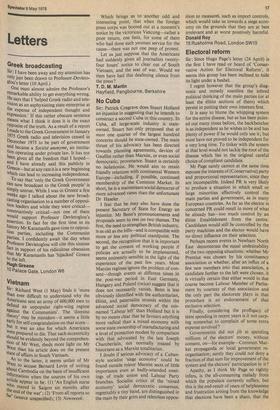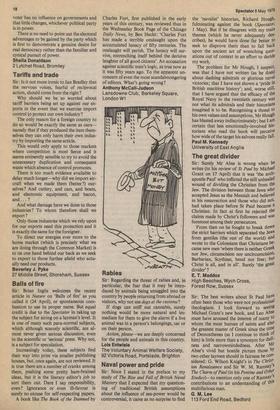Electoral reform
Sir: Since Hugo Page's letter (24 April) is the first I have read or heard of 'Conservative Action for Electoral Reform', it seems this group has been inclined to hide its light under a bushel.
I regret however that the group's diagnosis and remedy manifest the inbred political thinking of the main parties (or at least the elitist sections of them) which persist in putting their own interests first.
It is easy to blame the whipping system for the entire disease, but as has been pointed out many times before, the backbencher is as independent as he wishes to be and has plenty of power if he would only use it; but most have not proved to be independent for a very long time. To tinker with the system at that level would not tackle the root of the disease which lies in the original careful choice of compliant candidate.
Mr Page surely cannot at the same time espouse the interests of (Conservative) party and proportional representation, since they are incompatible. Indeed PR is very likely to produce a situation in which small or large minorities effectively control the main parties and government, as in many European countries. As far as the elector is concerned PR could result in more of what he already has—too much control by an elitist Establishment from the centre. Candidates would still be controlled by the party machines and the elector would have no direct influence on their selection.
Perhaps recent events in Newham North East demonstrate the equal undesirability of the two opposing situations: whether Mr Prentice was chosen by his constituency association or whether, after an influx of a few new members into that association, a candidate further to the left were chosen, it is virtually certain that either would in due course become Labour Member of Parliament by courtesy of that association and the only part the electorate plays in that procedure is an endorsement of that exclusive selection.
Finally, considering the profligacy of state spending in recent years is it not carping somewhat to complain of some extra expense involved ?
Governments did not jib at spending millions of the electors' money, without consent, on—for example—Common Market propaganda or local government reorganisation ; surely they could not deny a fraction of that sum for improvement of the system and the electors' participation in it ? Apathy, as I think Mr Page so rightly infers, is the all-consuming malady from which the populace currently suffers, but this is the end-result of years of helplessness and frustration arising from the knowledge that elections have been a sham, that the voter has no influence on governments and that little changes, whichever political party is in power.
There is no need to point out the electoral advantages to be gained by the party which is first to demonstrate a genuine desire for real democracy rather than the familiar and cynical pursuit of power.
Sheila Donaldson
2 Lytchet Road, Bromley



































 Previous page
Previous page